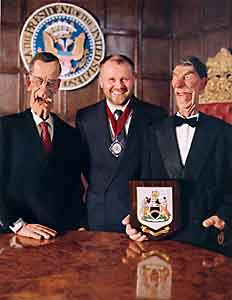The UK's Leading Authority on Digital Imaging
The UK's Leading Authority on Digital Imaging
When the Captain of a British Airways Boeing 747 took a copy of Digital PhotoFX to India recently it had a profound effect on the whole trip.
When it comes to planes, most of us couldn't tell the difference between the original Jumbos, introduced in the early 1970s, and one that's brand-new and just brought into service. As we drink our gin and tonic or Becks, seven miles up, we couldn't care less anyway.
Ask to visit the flight deck of one of the later 747-400s and you'll find it full of computer screens. It oozes digital. On the older 747-100 or -200s the instruments are dials, knobs and switches. Definitely analogue. You may also notice that the pilot is younger than the plane he's flying. But the important thing is that, whatever type of 747 you're on, they both do the same job of getting you from here to there and back quickly and safely.
In digital imaging we strive for pictures which look no different from the established benchmark - photographic quality prints. Yet today's digital imaging offers a number of exciting new facilities which were never available to us with the old photography. We can combine text and images on the same page for office reports and school projects.We can send images around the world by modem. We can start our own family portrait galleries on the Internet. Digital imaging is about pictures when you want, how you want, for whatever you want. In fact it's the long overdue democratisation of images.
Meanwhile, the 747 crew was resting between flights in New Delhi. The Captain has always been a keen photographer and, with a job in the high-tech world of flying, it's hardly surprising that he was one of the first to take up digital imaging, four years ago. He takes his Macintosh PowerBook - his digital 'lightroom' - with him down the routes, to while-away the days spent in hotel rooms. His crew to India had never been photographers but all had top-of-the-line laptop computers and were thinking of buying digital cameras to acquire images to send home by eMail. He showed them some of the many possibilities and, of course, they were hooked.
So, out there in India for a few days, the pilots formed an informal digital imaging group, to share what they knew. And the catalyst - 4,181 miles from dear old Blighty - was a well-thumbed copy of Digital PhotoFX issue two.
The chance of this crew flying together again is remote. Airline policy is not to have the same people working together regularly. But this group of enthusiasts continues by eMail and will grow as the original members share their enthusiasm with other pilots on future trips.
We don't have to become airline pilots to share our interest in
digital imaging though. Clubs, groups and societies are a great way
to share new-found skills, so all we have to do is find the local
Digital Imaging Club. Try looking in the local classified
directory.
You drew a blank, eh? Just like I did when I worked in television. TV has always been electronic imaging - the cameras have never needed film. There were no clubs, groups or societies catering for what we were doing, so we formed one: the Guild of Television Cameramen. Twenty five years later, it's still going strong. But some of us needed even more. We found it hidden deep within our major photographic bodies - the Royal Photographic Society and the British Institute of Professional Photography.
The RPS already has no less than four groups actively involved with different areas of digital imaging. The BIPP has offered professional qualifications in digital imaging for the past six years. Almost as old as photography itself, these organsisations can be very full of themselves - their own worst enemies. They have wonderful coats of arms and badges of presidential office which rival the finest mayoral chains - anachronistic trappings in the rapidly evolving world of imaging. But, make no mistake, the RPS and BIPP are part of our digital future. There have even been thoughts of changing their names to include "imaging" instead of "photography".
Above: John Henshall FBIPP FRPS accepting
the [BIPP] presidency from George Bush and Ronald Reagan in
1991. [In fact Bush and Reagan are Spitting Image puppets - John
was Director of Photography for Spitting Image at the time.] With
John resplendent in the BIPP presidential regalia, it kind of begs
the question, "Which one's the puppet president?
Photograph by Rob Kitzmann ABIPP.
The RPS has impressive but expensive museum-like headquarters in Bath, where exhibitions are held and one of the world's finest collections of photographs is housed. Have you ever tried to park in Bath on a summer weekend? It's time the RPS relocated near a national transport hub, or dispersed regionally, with rooms full of the latest digital imaging gear for members to learn to use. Unfortunately, such an inspired reallocation of resources would require years of committee meetings.
Our photo-monoliths are well intentioned but really do need rockets up their corporate backsides. So you should avoid them, right? No. There are no other bodies which come close to the BIPP and RPS when it comes to representing and inspiring those with an interest in digital imaging. Their places in the future of imaging are assured if those at the forefront of digital imaging are members. They need you - and you need them.
They need young lateral thinkers with computers - just as they needed lateral young thinkers with fingers smelling of hypo a hundred years ago - not to perpetuate the kind of the photography that's been around for a hundred and sixty years but to break the imaging mould. What they don't need are boring old farts in smoke-filled rooms. So join and help light the blue touch paper. Take them over. Take them into the twenty first century for the benefit of imaging and us all.
Or maybe you'd like to form your own group, like the pilots?

Anyone with an interest in imaging, whether amateur or professional, can join the RPS (founded 1853) as an ordinary member. The RPS doesn't have 'distinctions' (that's what LRPS, ARPS and FRPS are) specifically in digital imaging - it's the pictures which count and it matters little how you achieve them. If you're lucky, you might still be able to get an Associateship in a weekend by scanning your photos, putting them through a Photoshop filter and then outputting them onto watercolour paper using your inkjet printer. Striking new effects and treatments can impress judges.
Ordinary membership of the RPS costs £77 per year, with extra charges for each special interest group. Student membership is £28 per year. The RPS has four groups actively involved in digital imaging: Film and Video group (additional £7.50 per year), Visual Journalism group (£10), Imaging Science and Technology group (£5) and the recently formed Digital Imaging Group (£10). (Note: These were the 1998 rates. For the latest rates visit the RPS website.)

If you earn money from photography, the BIPP (founded 1901) is for you. Complementary to the RPS, it laid down criteria for qualifications in digital imaging six years ago. The basic grade of qualified membership is Licentiate (LBIPP) and standards are very high. Send them a fiver and mention Digital Photo FX for a post-free copy of the booklet 'Photographic Qualifications for Professionals' (normal price £7.50) to find out the requirements for LBIPP, ABIPP and FBIPP qualifications.
Affiliate (non-qualified) membership of the BIPP costs £115.80 per year. Student membership is a subsidised bargain at £25 for the duration of the course - up to five years. (Note: These were the 1998 rates. For the latest rates visit the BIPP website.)